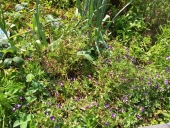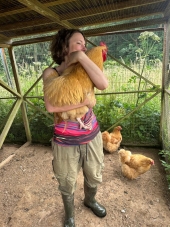posted 2 years ago
I absolutely LOVE Baker Creek, and not just because their germination rates for me are beyond fantastic. How often have I decided that a pack of 10-year-old seeds cannot possibly germinate, so I'll dump the rest of the whole pack in a pot..only to end up with 20 tomato seedlings!
Whereas other companies are hit and miss with germination, and the seeds that come up might be a bit wimpy, wonky, or waning.
Yes, it costs more. But I'm also a sucker for all the bizarre colors and latest varieties. Plus they do fundraisers from time to time, and my feeling philanthropic outweighs my guilt for buying EVEN MORE SEEDS...(I'm sure NOBODY HERE CAN RELATE TO THAT!!!) haha
But I also love them because of the many reviews, which help me to make choices beyond the descriptions (which are all--let's face it--glowing and positive.)
Local seeds here are grown on the outer islands, which have much higher rainfall and high elevations, putting them into subtropical territory, so local seeds don't always do a great job (although yes, I try to buy local varieties too, because especially with what the University of Hawaii develops, they can better withstand some of our neverending diseases and pests that never freeze or dry up, due to such mild weather.)
So I try out new varieties often by reading reviews by people who live in states with tropical climates, or with hot, humid summers and huge pest pressure, like in the South, or with alternating drought and hurricanes, like in Florida.
Although I also have to take into consideration that where I am, some people have loamy soil, some have sandy beach soil, and I have heavy clay. So that's a factor as well. Rainfall and weather patterns differ substantially here, too, so what grows well in a valley, with lots of rain, won't necessarily thrive in near-desert conditions in other areas.
That's why I love reading the reviews, because if someone reports that everything else got powdery mildew, but this pumpkin sailed through, that gets my attention. Or if a variety matures so fast, that people way up north grow it, that may work for me too, because all may be fine...until the next hurricane or storm system. So the faster it grows, the better...stuff like that.
I also buy based on reviews or videos from people in other parts of the world in a similar latitude, with likely a similar climate. In my case, from places like Indonesia, India, the Philippines, and Thailand. If the plants can survive their heat and humidity, which is even worse than ours, they will likely be fine here.
As you grow more, you'll see what issues pop up for you, and use reviews to pick varieties based on that. For example, when someone mentions their temperatures were so hot, but a tomato variety still produced, that gets my attention. Because we often cannot produce tomatoes due to our night time temperatures not getting cold enough, and definitely having daytime temperatures be too hot, for tomato flowers (they'll abort.)
You'll find out which diseases and pests are issues in your area, and reviews that mention surviving those things are worth noting for you to try.
Other companies I enjoy: Southern Exposure Seed Exchange, Seed Savers Exchange, Victory Seeds (lots of old varieties that tend to get forgotten), and Asian Garden 2 Table (although the germination can be kind of bad sometimes, I've noticed, she sells a huge variety of Asian vegetables, which match the climate, culture, and palates of Hawaii very well. Unfortunately, some of those seeds are treated, and they aren't listed as treated or not, so keep that in mind.)
Nichol's Garden Nursery and Strictly Medicinal Seeds are wonderful for herb seeds, especially those rarer ones, and stuff most people have never heard of.
I would also encourage, especially if you have room to grow, planting seeds/cuttings from food you buy from local farmers or markets. Often those have been passed around and are like landraces, without you having to do the seed saving. If you end up with a new variety (for example, if you plant seeds from citrus fruits and get something new and unique), you could turn that into a business, too.
One tip: get on the email lists for the seed companies, because many have sales at the end of the season. You can get highly discounted seeds. (works great for me, since our best growing season starts in the fall, just after most others have stopped...but also because I like to get a lot of seeds for some things that the slugs and snails decimate. It gets very pricey when you lost 50-75% of what you plant to slugs, snails, rodents, and weather damage. And you can try out some things you didn't want to pay full price for, too...assuming they haven't sold out.)
Companies often do seasonal or holiday promos (like Mother's Day, Black Friday, etc.)
And I like to keep old seed catalogs, because some companies do not print variety info on the packages...so I have to look it up in a catalog. Or I have older seeds that aren't listed in this year's catalog, so I find that info in an old catalog, or one from another company. Lastly, having colorful photos helps me to identify varieties when, for example, I've not labelled things properly, or the tag breaks off, or pots with seedlings get blown around by the wind, and tags and seedlings are thrown everywhere, leaving me to try to figure them out after they've grown and matured.
Stores may discount old seeds at the end of the calendar year or in the spring, just as they get new seeds. But keep tabs on the quality--one vendor's seeds are no bargain, because even at half price, when nothing germinates, that's no deal.
When you trade seeds or get them from others locally, there is the fun of seeing what comes up, because often they'll tell you it's just, "okra," or "pumpkin," with no variety name or other information to go by. If you're lucky, it'll do well for you, taste good, AND you like it, too...be sure to save seeds from it, if so!
In two years, I expect to see you start a post saying, "Hello, my name is _____, and I'm a seedaholic!"

 3
3




 9
9




 5
5





 3
3





 4
4




 4
4




 4
4





 9
9
















 3
3




 5
5




 6
6




 9
9




 5
5









